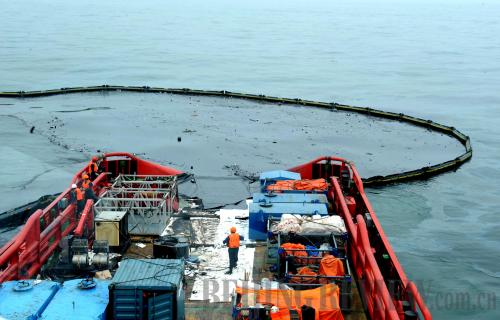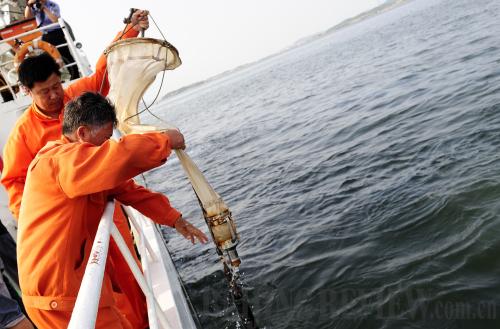|
 |
|
CLEANING THE SEA: A vessel from the China Offshore Environmental Service lays protective booms around the area affected by oil leakage off the Dalian coast in Liaoning Province on July 19 (LI GANG) |
More than 800 fishing boats in Dalian, a coastal city in northeast China's Liaoning Province, joined the effort on July 20 to clean up crude oil that gushed into the sea after two oil pipelines exploded at Dalian Xingang Harbor four days earlier.
A 0.9-meter-diameter oil pipeline exploded at 6:20 p.m. on July 16 and triggered a blast at a smaller pipeline nearby, Xinhua News Agency reported.
The blasts caused a fire and an oil slick that stretched 183 square km off the Dalian coast by July 20, local authorities said.
Fast action
 |
|
CHECKING THE SEA: Workers with the State Oceanic Administration examine the water in the affected sea area (REN YONG) | China Central Television said the explosion happened when the 300,000-ton Liberian tanker was unloading oil at the harbor. It said the tanker, carrying 27 sailors, left safely.
The two pipelines, owned by China National Petroleum Corp. (CNPC), were links between oil ships and oil tanks on land.
The accident prompted instructions from President Hu Jintao and Premier Wen Jiabao. Vice Premier Zhang Dejiang rushed to the site on the night of July 16.
China's Air Force sent two Y8 aircraft to the rescue operation, carrying 17.8 tons of fire extinguishing agent.
Firefighters put out the blaze at the larger pipeline at around midnight. But at least five subsequent explosions fueled the fire at the smaller pipeline.
Firefighters got the flames under control by switching off valves on all oil tanks, said Xu Guochen, Secretary General of Dalian Municipal Government.
He said it took more than 2,000 men and 338 fire engines from 14 cities across the province 15 hours to extinguish the fire.
Cleanup efforts
An inspection team was formed on the morning of July 18 to investigate the blasts, but the cause of the accident has not yet been determined, said Sun Benqiang, Deputy Director of Dalian Municipal Work Safety Bureau.
After the fires were extinguished, workers began using oil skimmers and dispersants to contain the oil slick and prevent it from spreading beyond the port into the Yellow Sea.
At a press conference on July 19, Xu said the fires had been completely extinguished and the focus had shifted to ocean cleanup and the investigation into the cause.
By the evening of July 18, about 7,000 meters of floating booms had been set up and at least 20 oil skimmers were working to clean the spill, the Liaoning Maritime Safety Administration said.
As of July 19 a total of 260 tons of oil had been collected by the local fisheries department and another 180 tons collected by the oceanic department, said Luan Yuxuan, Deputy Director of Dalian City Oceanic and Fishery Administration.
The cleanup began with an initial 20 vessels, including four patrol boats from the provincial maritime bureau.
As of July 20, 24 oil-cleaning vessels had been mobilized and more than 800 fishing boats had also joined cleanup efforts, said Luan.
Meanwhile, more than 23 tons of oil-eating bacteria were also used to clean up the spill.
"We received orders from the Maritime Safety Administration on July 17 for bio-oil-absorbing products," Yang Jiesen, Manager of the Research and Development Center at Beijing Weiyeyuan Bio-Technology Co., told Xinhua.
The use of oil-eating bacteria at the Dalian spill is the first time China has taken biotechnology to solve that environmental pollution of such magnitude.
Wu Jin with the Institute of Microbiology at the Chinese Academy of Sciences said oil-eating bacteria, unlike chemical oil-dispersants, works 24 hours a day and is more environmental friendly.
Wu said the best way to clean up the oil spill in the shortest time is to combine physical, chemical and biological cleanup methods.
Influences
On July 18, CNPC vowed to "do its best" to reduce the impact of the explosion. Oil that spilled into the sea had been fenced off and contained, it said.
More than 20 air surveillance points and 10 offshore surveillance points are also monitoring the situation, said Wu Guogong, Deputy Director of Dalian Municipal Environmental Protection Bureau.
| 